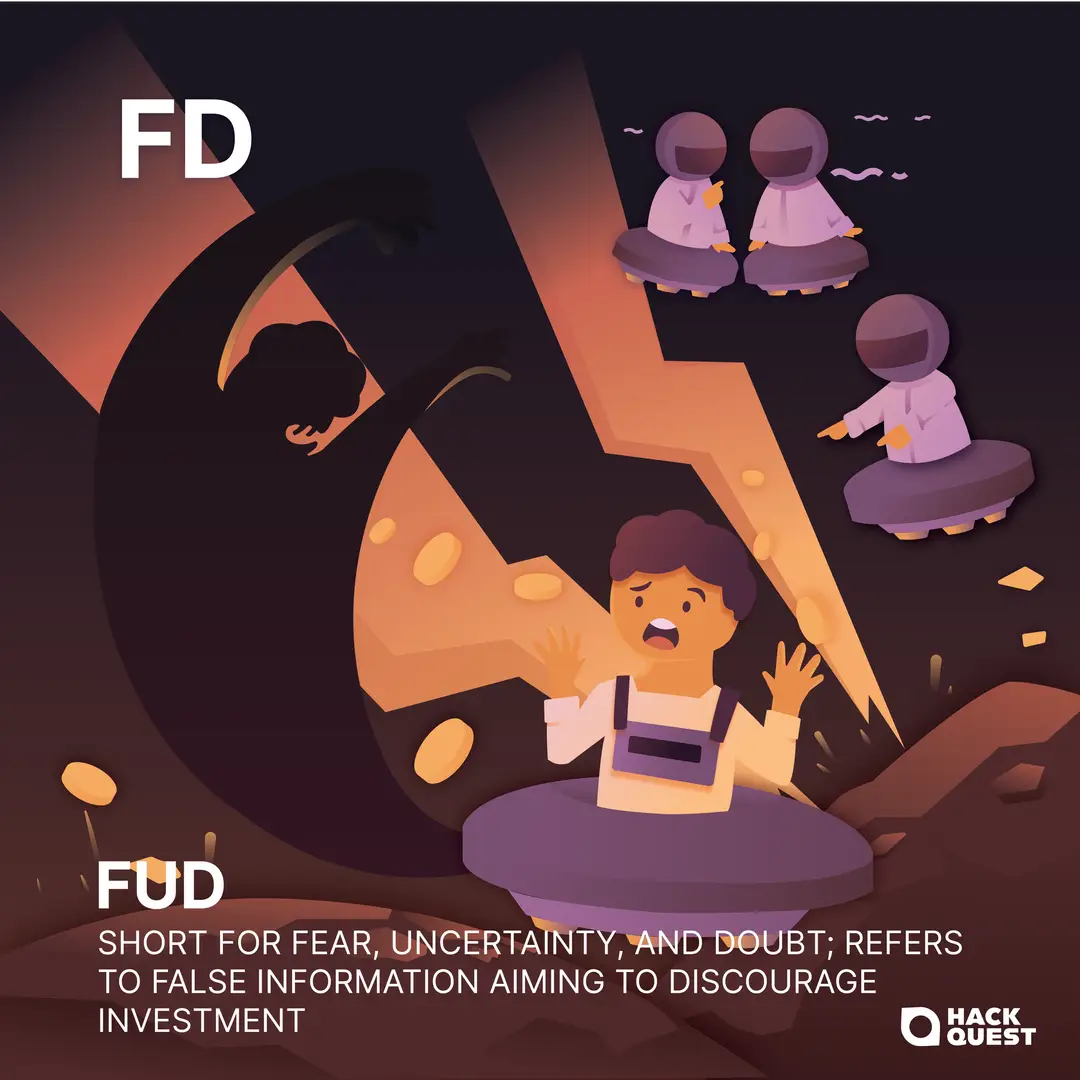Back
Fear, Uncertainty and Doubt (FUD)
Slang
By HackQuest
Apr 2,20245 min readSpreading negative information or skepticism to manipulate prices or sentiment in the market.
Welcome to the world of Web3, where cryptocurrencies, blockchain, and a unique culture converge. Entering the world of Web3 can be both thrilling and overwhelming, especially when faced with the seemingly cryptic language used by enthusiasts. Don't worry if you feel they sound like some secret codes, we are here to unravel their meaning in Web3 context. In this article, we are going to introduce [FUD].

What is the meaning of FUD?
FUD stands for "Fear, Uncertainty, and Doubt." It's not a complex financial term or a secret code; it's simply an acronym used to describe a common phenomenon in cryptocurrency. FUD refers to the spread of negative information, often to create fear, uncertainty, and doubt among investors and enthusiasts.
💡
Example Sentence: DON’T PANIC! It’s only FUD.
The origin of FUD
In the world of technology, IBM once employed a clever strategy to undermine its competitor, Amdahl Corporation, founded by Gene Amdahl. They spread negative information to create "FUD" (Fear, Uncertainty, and Doubt) about Amdahl's products, sowing doubt in potential customers' minds. FUD, born from this rivalry, later became a widespread term describing the practice of spreading negative information about competitors in various industries. In the world of cryptocurrencies and finance, FUD found a new purpose—creating panic and doubt about specific assets. FUD's evolution reminds us of the power of information in technology, finance, and beyond.

Source: SlidePlayer
How Does FUD Work?
FUD can manifest in various ways within the crypto space:
1.False Rumors: Someone might spread false rumors about a cryptocurrency project, claiming it's a scam or on the verge of collapsing. This can lead to panic selling by investors.
2.Exaggerated Risks: FUD can involve exaggerating the risks associated with a particular coin or technology. For example, stating that a blockchain is vulnerable to hacking when it's not.
3.Negative News: FUD can be fueled by negative news articles or sensationalist headlines. Even if the news is inaccurate or taken out of context, it can create fear among investors.
4.Social Media Influence: Social media platforms are a breeding ground for FUD. Individuals or groups with large followings can spread FUD through posts, tweets, or videos.
📢
How to Deal with FUD
As a beginner in the cryptocurrency world, it's essential to be aware of FUD but not let it control your decisions. Here are some tips on how to deal with FUD:
Do Your Own Research(DYOR)
Always verify information from multiple sources before making investment decisions.
Stay Informed
Keep up with the latest news and developments in the crypto space to distinguish between genuine concerns and baseless FUD.
Stay Calm
Don't make impulsive decisions based on fear. Cryptocurrency markets can be highly volatile, but knee-jerk reactions are rarely beneficial.
Join Communities
Engage with crypto communities and forums where you can discuss FUD with experienced investors who can provide valuable insights.
Conclusion
FUD is a term you'll encounter frequently in the cryptocurrency space. While it can be a disruptive force, being informed and level-headed is your best defense. Remember that FUD is often driven by personal interests, and staying educated and vigilant will help you navigate the exciting but sometimes turbulent world of cryptocurrencies.
If you would like to learn more about such Web3 slang, let’s explore more in our HackQuest Web3 Glossary!